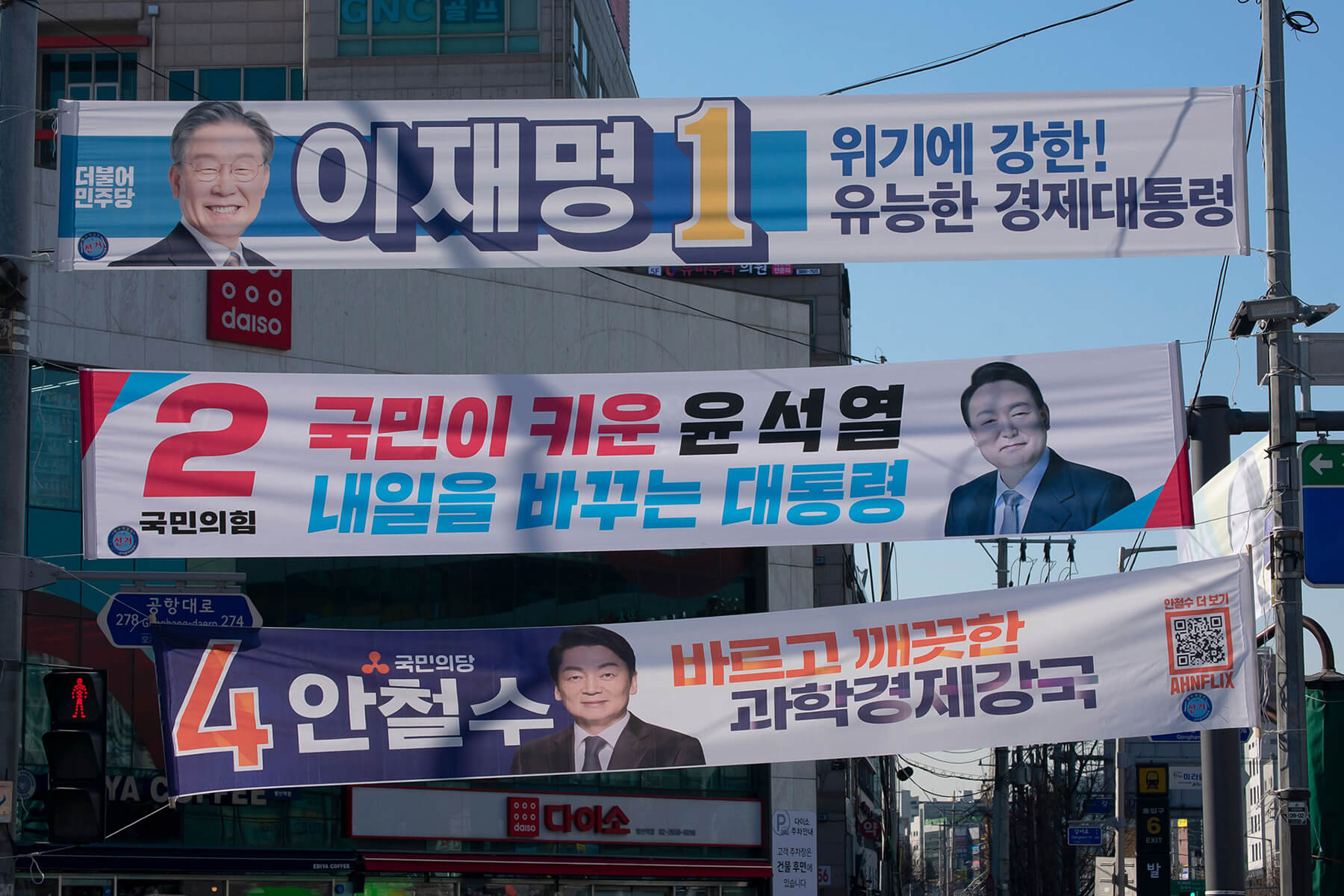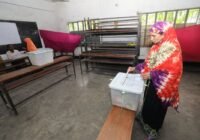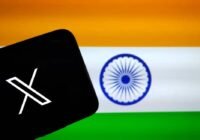On March 9, Yoon Seok-yeol of the conservative People Power Party (PPP) won the South Korean presidential elections by a slim margin. Yoon won 48.6% of the vote while Lee Jae-myung, his rival from the Democratic Party (DP) was not far behind at 47.8%. After five years of rule by President Moon Jae-in of the DP, the presidential Blue House will once again be occupied by a conservative.
Ironically, Moon appointed Yoon as prosecutor general of the country. As the top prosecutor, Yoon secured the conviction of two former conservative presidents for corruption. He also pressed charges against Samsung Chairman Lee Jae-yong who was sentenced to prison in a bribery scandal. “Owing loyalty to nobody,” Yoon then went on to investigate members of the Moon administration, catapulting this star prosecutor into the national limelight and eventually making him the PPP candidate.
Yoon is an outsider. He has no administrative experience and little access to Seoul’s political networks. He has not even served as a member of parliament. The fact that Yoon came out on top confirms that public popularity is now more important than party allegiance and political or administrative experience in the South Korean presidential system.
The election — although very close nationwide — exposed South Korea’s regional division. In this country, political parties are not primarily divided by ideology or political platforms but rather by history and regional origins. In the southwestern Cholla provinces, more than 80% voted for Lee while the southeastern Kyongsang regions voted overwhelmingly for Yoon.
A Terrible Housing Crisis and Gender Issues
The biggest surprise was that Yoon won the capital city of Seoul, a stronghold of the DP. This crucial victory helped him win the election. It hinged on the only political issue that mattered during the campaign: unaffordable housing prices. The Moon administration failed to address this burning issue, which hurt the DP.
The overwhelming importance of this matter can only be understood in the context of the jeonse rental system in South Korea. Jeonse requires lump sum payments and directly links rents to real estate prices. In addition, rental contracts are limited to two years and there is almost no protection for tenants who are left to the whims, fancies and even tyranny of their landlords. The Bertelsmann Stiftung’s 2021 South Korea Report observed that: “While regulations on homeowners and tenant protection have been slightly improved, they have failed to arrest the massive increases in housing costs in the urban centers.”
COVID-19 Policies Carry Implications for South Korea’s Presidential Election
In these elections, a gender divide emerged among younger voters. Only 34% of women in their 20s voted for Yoon in contrast to 59% of men in the same age group. This was by far the largest gender divide among different age groups ever recorded. In the past, younger voters have tended to vote for the DP. Yoon appealed to young men by opposing “feminism” and even promising to abolish the ministry of gender equality. Note that South Korea’s average gender pay gap is one of the largest in the world. Furthermore, South Korea’s labor-force participation rate among women is the fifth-lowest among the 29 EU and OECD countries as per a report on Sustainable Governance Indicators (SGI). The authors of the report see a “continued prevalence of traditional ideas about family and gender roles.“ On a related note, Shim Sang-jeung, the highest-ranked female presidential candidate of the progressive Justice Party received only 2.4% of the vote as compared to 6.2% in 2017, exposing the crisis in which the political left now finds itself in South Korea.
A Tricky Political Situation
Over the years, election campaigns have become almost completely personalized and devoid of political agendas. Negative campaigning now delves into character flaws of the candidates and even of their wives. Particularly shocking is how vital issues, such as the extreme environmental degradation in South Korea or how the country plans to combat climate change fail to feature in presidential debates. South Korea has the lowest share of renewable energy among the 41 countries examined by the SGI report. A later report takes the view that South Korea “is more focused on [its] growth aspect than on environmental protection.”
It is difficult to predict the direction the Yoon administration will take during its five-year tenure which begins on May 10. As a political and administrative novice, Yoon will rely on his party and the bureaucracy. When it comes to economic and social policies, Yoon – the son of a market-liberal economics professor – promised to reduce government interventions. However, he is likely to make little headway because his party does not have a majority in the parliament. The DP commands a strong majority with 172 out of 300 seats. It can shoot down Yoon’s economic policies even though it may not have the two-thirds majority needed to override presidential vetoes, amend the constitution, or impeach the president.
While the South Korean president has strong constitutional powers and can rule by decrees, his ability to impose radical changes without proper legislation is limited. If the president ends up in a standoff with parliament, the country could end up in political gridlock. This might cause instability or, on a more positive note, inaugurate a new era of cooperation and compromises between the two camps or even a complete reorganization of political parties. Yoon’s election has upped the political ante for the country. Now, all parties are focused on the next parliamentary election in 2024.
Foreign Policy Ambitions
If things seem rocky on the domestic front, they are better when it comes to foreign policy. For a long time, relations with North Korea, China, Japan and the US have been one of few ideological divisions between the two large parties. Moon’s presidency adopted the classic DP agenda of engaging North Korea to achieve an as-yet unfulfilled goal of signing a peace treaty or at least an end-of-war declaration. The PPP fiercely opposed the DP on this issue. Conflict with North Korea has long been a means for the conservative PPP to rally its supporters. Members of the PPP also fear that a peace treaty would undermine South Korea’s alliance with the US, risking the withdrawal of American troops.
Yoon is likely to use the PPP’s excellent ties with the US to strengthen the US-South Korea alliance. His government is likely to repair relations with Japan. Japan-South Korea relations have deteriorated due to friction over Japanese reparations for its colonial atrocities in Korea. Closer ties to the US and Japan will give Yoon less leeway in dealing with China and Russia. When it comes to the war in Ukraine, Yoon is likely to put South Korea more firmly on the US side and against Russia. Under the new president, South Korea, Japan and the US are likely to come closer together to strengthen the rules-based international order in Asia.
The views expressed in this article are the author’s own and do not necessarily reflect Fair Observer’s editorial policy.
Support Fair Observer
We rely on your support for our independence, diversity and quality.
For more than 10 years, Fair Observer has been free, fair and independent. No billionaire owns us, no advertisers control us. We are a reader-supported nonprofit. Unlike many other publications, we keep our content free for readers regardless of where they live or whether they can afford to pay. We have no paywalls and no ads.
In the post-truth era of fake news, echo chambers and filter bubbles, we publish a plurality of perspectives from around the world. Anyone can publish with us, but everyone goes through a rigorous editorial process. So, you get fact-checked, well-reasoned content instead of noise.
We publish 3,000+ voices from 90+ countries. We also conduct education and training programs
on subjects ranging from digital media and journalism to writing and critical thinking. This
doesn’t come cheap. Servers, editors, trainers and web developers cost
money.
Please consider supporting us on a regular basis as a recurring donor or a
sustaining member.
Will you support FO’s journalism?
We rely on your support for our independence, diversity and quality.








Comment